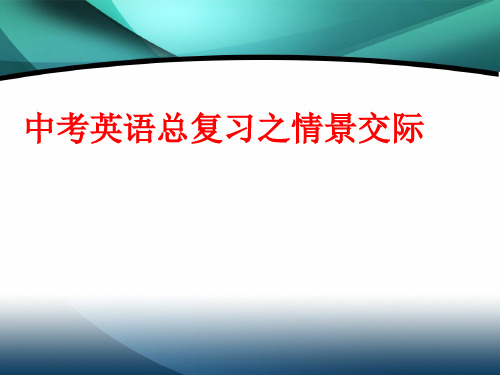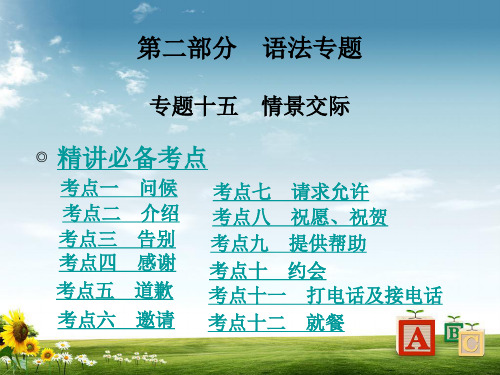中考英语专题十五+情景交际课件
合集下载
情景交际(45张PPT)初中英语专项复习课件

考点清单 1.某人取得成功 I have passed the examination!我已经通过考试了! 应答时常说: Congratulations (to you)!祝贺你! 2.外出旅行 Good luck with your trip!/Have a good trip!一路顺风! Have a nice/pleasant/wonderful time!祝你玩得愉快!
考点清单 1.劝告、建议 You’d better (not) do sth.你最好(不)做某事。 You should (not) do sth.你(不)应该做某事。 You need (not) do sth.你(不)需要做某事。 Why don’t you do sth.?/Why not do sth.?为什么不做某事? How/What about doing sth.?做某事怎么样? Shall we...?/Let’s...,shall we?我们去……怎么样?
wait.A.That’s all right
B.You’re welcomeC.That’s a great idea
D.Thank you for your help
【答案】C 【解析】句意:——工作结束后,让我们做一杯香蕉奶昔。——好主意,我等 不及了。考查情景交际。That’s all right没关系;You’re welcome不客气;That’s a great idea好主意;Thank you for your help谢谢你的帮助。根据“Let’s make a banana milk shake after finishing the work.”可知这是一个建议,结合“I can’t wait.” 可知对方的建议是好主意,C选项符合语境,故选C。
情景交际(35张PPT)初中英语专项复习课件(2)

—
. I’ve ordered enough.
A. Yes, please C. No, thanks
B. My pleasure D. Never mind
( C )5. —
, could you tell me where to park my car?
— Sure. There’s an underground parking lot over there.
5.—_____C____! Hope is always around you.
—Thank you,Miss Liu.
A.Don’t be lazy
B.Don’t mention it
C.Never lose heart D.Never show off
6.—I’m going to have a bicycle tour in the countryside this weekend.
考点精讲6 感谢或道歉答语 1. That’s OK(all right)./Not at all./You are welcome. 不客气。 2. Never mind./It doesn’t matter./Forget it. 没关系。 3. Don’t mention it. 不用谢;没关系;不谢。
4.—I hope you don’t mind my pointing out your mistakes.
—_____A____. Thank you for your advice.
A.Not at all
B.You are welcome
C.Of course
D.It’s a pleasure
C.Help yourself
2019广东中考英语(人教) 语法精讲精炼 第十五节 情景交际(共78张PPT)

做错事时: 1.Sorry./I'm sorry./I'm sorry for… 2.I'm sorry to 道 5 interrupt you. 歉 对不起,打扰您了 。 3.I'm sorry that I'm late.
话 题
情景
回答
1.That's OK./That's all right./Not at all. 2.It doesn't matter. 要麻烦别人时: 3.That's nothing. 道 5 1.Excuse me. 4.Never mind.没关 歉 2.I beg your pardon. 系。5.Forget it.算 对不起,请原谅。 了吧/没什么。 6.No problem./Don't
话题
回答
1.It's a pleasure./My pleasure./With pleasure. 2.That's OK./That's all right./Not at all./You're welcome .3.Don't mention it.
话 题
情景
回答
1.That's OK./That's all right./Not at all. 2.It doesn't matter. 3.That's nothing. 4.Never mind.没关 系。5.Forget it.算 了吧/没什么。 6.No problem./Don't
话题
邀请 (201 6 7年 考)
情景 1.Would you like to…? 2.Will you come to…? 3.May I invite you to dinner?4.Ho w/What about having a walk?
2023年中考英语情景交际+课件

的路吗? • Could you tell me how I can get to...? 你能告诉
我怎么去·....·吗? • Is this the way to...?这是去··...·的路吗? • How far is it from...to...?从·....·到......有多远?
2. 常见应答语
2. 常见应答语
• Sorry, I'm a stranger/new here. • 对不起,我对这儿比较陌生/我是新来的。
• It's next to the.../in front of the.../behind the.../outside the.../between...and...
• Have you had anything to eat this morning? • 早晨你吃过什么东西吗? • Let me exam you.让我为你检查一下。 • Does it hurt here?这里痛吗? • You have a high temperature.你发高烧了
• I’m sorry to hear that.
• 1.常见打电话用语 • May/Could/Can I speak to...?请找.....接电话,好吗: • Who's that (speaking)?你是哪一位啊? • Hello , is that...speaking? 你好,是·....·吗? • Is...at home\in?..·在家吗? • This is...(speaking).我是··
• 2.常见应答语: • 接电话人的回答: • Hello! This is...speaking. • 你好,我是...... • Speaking please.请讲 • Who’s that speaking? 。你是谁
我怎么去·....·吗? • Is this the way to...?这是去··...·的路吗? • How far is it from...to...?从·....·到......有多远?
2. 常见应答语
2. 常见应答语
• Sorry, I'm a stranger/new here. • 对不起,我对这儿比较陌生/我是新来的。
• It's next to the.../in front of the.../behind the.../outside the.../between...and...
• Have you had anything to eat this morning? • 早晨你吃过什么东西吗? • Let me exam you.让我为你检查一下。 • Does it hurt here?这里痛吗? • You have a high temperature.你发高烧了
• I’m sorry to hear that.
• 1.常见打电话用语 • May/Could/Can I speak to...?请找.....接电话,好吗: • Who's that (speaking)?你是哪一位啊? • Hello , is that...speaking? 你好,是·....·吗? • Is...at home\in?..·在家吗? • This is...(speaking).我是··
• 2.常见应答语: • 接电话人的回答: • Hello! This is...speaking. • 你好,我是...... • Speaking please.请讲 • Who’s that speaking? 。你是谁
情景交际(35张PPT)初中英语专项复习课件

情景交际
初中英语专项复习
• 考点一 对话问答必备 一、生活与学习
1.I’ll take it/them.我买下了。 2.Here you are.给您/您拿好了。 3.Have a good day!玩得开心! 4.Is that OK with you?你看可以吗? 5.What can I do for you/How can I help you?需要我帮忙吗? 6.Did you buy/do anything special? 你买/做了什么特别的东西/事情吗?
提醒
道歉 应答
预约 应答 劝告 建议
Look out! Mind your step!
Wet floor! Don’t touch!
I beg your pardon. Never mind.
I’m sorry for… That’s all right.
It’s nothing. It doesn’t matter.
—
.
A. That’s right C. You’re welcome
B. I’m fine D. Great idea
( C )12. — Home is always the warmest place.
—
. East or west, home is the best.
A. I don’t think so B. I’m afraid not C. I couldn’t agree more D. I hope not
7.That’s…,isn’t it?那是……,对吗? 8.Well,that’s it.好了,就这样了。 9.What would you like?您需要什么? 10.What happened?发生什么事了? 11.Feel free.请随意。 12.As far as I know…据我所知…… 13.It takes time.这需要时间。 14.Take your time.慢慢来。 15.Mind your manners!注意你的礼仪!
初中英语专项复习
• 考点一 对话问答必备 一、生活与学习
1.I’ll take it/them.我买下了。 2.Here you are.给您/您拿好了。 3.Have a good day!玩得开心! 4.Is that OK with you?你看可以吗? 5.What can I do for you/How can I help you?需要我帮忙吗? 6.Did you buy/do anything special? 你买/做了什么特别的东西/事情吗?
提醒
道歉 应答
预约 应答 劝告 建议
Look out! Mind your step!
Wet floor! Don’t touch!
I beg your pardon. Never mind.
I’m sorry for… That’s all right.
It’s nothing. It doesn’t matter.
—
.
A. That’s right C. You’re welcome
B. I’m fine D. Great idea
( C )12. — Home is always the warmest place.
—
. East or west, home is the best.
A. I don’t think so B. I’m afraid not C. I couldn’t agree more D. I hope not
7.That’s…,isn’t it?那是……,对吗? 8.Well,that’s it.好了,就这样了。 9.What would you like?您需要什么? 10.What happened?发生什么事了? 11.Feel free.请随意。 12.As far as I know…据我所知…… 13.It takes time.这需要时间。 14.Take your time.慢慢来。 15.Mind your manners!注意你的礼仪!
2020中考英语复习课件:专题十五 情景交际(共46张PPT)

语法突破篇
专题十五 情景交际
中考导航 思维导图 精研真题 精讲重点 满分突破 对点集训
-15-
5.问候 问句 直接问候: How’s it going?最近好吗? Nice to meet/see you. 很高兴见到你。
How’s everything with you?/How is everything going?/How are you getting on?What’s on/up?近来怎么样? 间接问候: Please give my regards/best wishes/love to...请代我向……问好。 Say hi/hello to...向……问好。
语法突破篇
专题十五 情景交际
中考导航 思维导图 精研真题 精讲重点 满分突破 对点集训
-14-
否定答语: Sorry, I’m afraid I can’t./We won’t do that again. 对不起,我恐怕不行。 /我们不那样做了。 You’d better not. 你最好不要。 I’m afraid not. 恐怕不行。 I’m sorry you can’t...很抱歉,你不能……
专题十五 情景交际
语法突破篇
中考导航 思维导图 精研真题 精讲重点 满分突破 对点集训
-8-
答句 Come on.You can do it. 加油。你可以的。
Take it easy.We believe you are great. 别着急。我们相信你很棒。 You’d better...你最好…… Don’t worry...不要担心……
语法突破篇
专题十五 情景交际
中考导航 思维导图 精研真题 Yes./Sure./Of course. 当然可以。 No, not at all. 不,一点儿也不介意。 Not at all.Here you are. 一点儿也不,给你。 Yes,do please./Go ahead,please. 请吧。 That’s OK./All right. 好的。 No, I don’t mind. 不,我不介意。 Certainly not./Of course not. 当然不(介意)。 No, go ahead. 不(介意),你干吧。
福建省中考英语情景交际讲练课件 (共21张PPT)

问路
Which is the way to ...? How can I get to...? Is there a...near here? Could you tell me the way to...
问天气
What's the weather like?
How is the weather?
问看法
What do you think of... How do you like...
2020/8/7
4
2.请求、征求意见、邀请
请求
Could you give me some advice on...? Could you help me with my English? Could you tell me+从句 May I come in? May I ask you some questions? May I help you? May I have the menu? May I have the bill? May I speak to...?
2020/8/7
应答
Not at all. Of course not. Certainly not Sorr y. I won't do that again I'm sorry about that. Good idea. No,you needn't/don't have to.
6
2.请求、征求意见、邀请
2020/8/7
应答 Sure, I’d love/like to. I'd be glad to. Good idea. All right. Of course. C e r t a i n l y.
中考英语总复习 情景交际课件

5.Shall we …? 我们……
Good idea! /That sounds good.
6.Let's …让我们……
Sure./Of course./Good idea!
考点链接
A (
) —Would you mind if I sit here?
—________. It's for Miss Zhang.
A.Never mind
B.Good luck C.What a pity D.My pleasure
解析:B 情景题。题意:“我下月将去参加《中国达人秀》。”“祝你好运! 我相信你会赢的。”
考点链接
A ( )2. —Yesterday I won the first place in the 100meter race.
—Really? ________!
A.Congratulations C.That‘s all right
B.Never mind D.I'm sorry to hear that
解析:A 根据前句,是听到好的消息,礼貌性的应该回答“Congratulations! 祝贺你!”
考点三 征求意见及应答
常用的征求意见句型
常用的应答
1.May/Can I…? 我可以……吗?
Yes./Certainly./Sure./Of course.当然可以。
Go ahead, please./Of course not.你请。/当然不 2.Would /Do you mind if I … 你介意我……吗?介意。
Not at all. 不用谢。 That's all right/OK. 不客气。 You're welcome. 不用谢。 (It's) my pleasure.别客气。 Don't mention it. 不用谢。
中考英语专题十五+情景交际完整ppt课件

going? / How are you getting on? / What’s up? — Pretty well. / Very well. / Everything is OK. / Not too bad.
2.间接问候的常用语
Please give my regards / best wishes / love to ...
第二部分 语法专题
专题十五 情景交际
◎ 精讲必备考点
考点一 问候 考点二 介绍 考点三 告别 考点四 感谢 考点五 道歉
考点六 邀请
考点七 请求允许 考点八 祝愿、祝贺 考点九 提供帮助 考点十 约会 考点十一 打电话及接电话 考点十二 就餐
考点十三 看病 考点十四 购物 考点十五 问路 考点十六 谈论天气 考点十七 语言交际困难 考点十八 警告和禁止 考点十九 劝告 考点二十 建议 考点二十一 表示同意或不同意 考点二十二 喜好、厌恶和和偏爱 考点二十三 表示肯定、否定及不确定 考点二十四 关心和焦虑
2. 对感谢的应答
You’re welcome.
Not at all.
It’s a / my pleasure.
I’m glad I could do it.
That’s OK / all right.
【典例精析】
— Congratulation. Your performance is excellent!
A. Not too bad
B. Can’t be worse
C. On my own
D. By train
解析:问句意为“伙计,最近怎么样?”根据答语的第
二句意为“尽管有点忙。”可知,答话人对自己最近的
状态还比较满意。A项意为“还不错”;B项意为“不能
2.间接问候的常用语
Please give my regards / best wishes / love to ...
第二部分 语法专题
专题十五 情景交际
◎ 精讲必备考点
考点一 问候 考点二 介绍 考点三 告别 考点四 感谢 考点五 道歉
考点六 邀请
考点七 请求允许 考点八 祝愿、祝贺 考点九 提供帮助 考点十 约会 考点十一 打电话及接电话 考点十二 就餐
考点十三 看病 考点十四 购物 考点十五 问路 考点十六 谈论天气 考点十七 语言交际困难 考点十八 警告和禁止 考点十九 劝告 考点二十 建议 考点二十一 表示同意或不同意 考点二十二 喜好、厌恶和和偏爱 考点二十三 表示肯定、否定及不确定 考点二十四 关心和焦虑
2. 对感谢的应答
You’re welcome.
Not at all.
It’s a / my pleasure.
I’m glad I could do it.
That’s OK / all right.
【典例精析】
— Congratulation. Your performance is excellent!
A. Not too bad
B. Can’t be worse
C. On my own
D. By train
解析:问句意为“伙计,最近怎么样?”根据答语的第
二句意为“尽管有点忙。”可知,答话人对自己最近的
状态还比较满意。A项意为“还不错”;B项意为“不能
英语中考语法+情景交际课件

(Yes,) I’d like ... / No, thanks. Just a little, please. 客人常用语 Can I have some more soup? It’s so delicious. Thank you. No, thank you. I’ve had enough. I’m full. Thank you.
医生诊断 常用语
What’s the matter? What seems to be the trouble? Do you have a fever? How long have you been like this? It’s nothing serious. Take the medicine three times a day. You’ll be all right / well soon.
提醒注意
Don’t forget your raincoat. Rememer to lock the door. Mind your head/step! No smoking! 常用语 Wet floor! Look out! Be careful! Don’t touch! It’s dangerous!
常用答语 3. Very well, thank you. 4. Not bad. 5. Pretty good.
6. Nice to meet / see you (again).
致谢
1. Thank you (very much)./ Thank you a lot. 2. Thanks./ Thanks a lot./ Many thanks. 常用句式 3. Thanks for … / Thank you for ... 4. It’s very kind / nice of you. 5. Thank you anyway / all the same. 1. Not at all. / That’s OK. / That’s all right. / 常用答语 You’re welcome. / No problem. 2. It’s a pleasure. / My pleasure.
情景交际(80张PPT)初中英语专项复习课件

D.Never mind
答案 A
解析 考查情景交际。上文句意:妈妈,我可以和你谈谈我的工作机会的事吗?Go ahead
请说;I see我明白;Much better好多了;Never mind没关系。理解语境可知A项符合。
5.—May I use your computer?
—
,but first you have to fold the clothes.
Wait a minute等一会。根据“Just try your best!”可知,此处应是一句加油鼓励的话语,故
选B项。
3.—Oh,no!My mobile phone is missing!
—
.Go to the lost and found office.They might have it.
D.that’s great
答案 D
解析 考查交际用语。句意:——中国神舟十五号载人飞船上的三名航天员于2023年6
月4日成功着陆。——哇,太棒了!no problem没问题,没事儿; with pleasure没问题,很荣
幸;never mind没关系,不用担心;that’s great那太好了。根据句意可知,航天员的成功着
—
!Just try your best!
A.Good idea e on
C.Thank you D.Wait a minute
答案 B
解析 考查情景交际。句意:——爸爸,明天我们将和一支强队进行足球比赛。——加油
!尽你全力!Good idea好主意;Come on加油;Thank you谢谢你;
祝福对方“旅行愉快,玩得开心”。
5.—I will take the PE test tomorrow.
中考英语情景交际(共13张PPT)

3.Have you taken your temperature?
4.Take the mmuch water./Have a good rest./You ‘ll be
better soon. 病人说的话:1.What should I do?
根据语境,完成句子
A:Good afternoon. B:Good afternoon.__W_h__a_t’_s_w_r_o_n_g_/_t_h_e__m_a_t_te_r__(w__it_h_y_o_u__) _? A:I’m not feeling well and I have a headache. B:(2)_H_o__w_l_o_n_g__h_a_v_e_y_o_u__b_e_en__l_ik_e__th_i_s_? A:Since last week. B:Have you taken your temperature?
A:Hello,could I speak to Linda?
B B:Ok,___________,please. E A:Sorry,______________.She went to the
library.
C B:__________________? D A:I don’t know.____________________?
A:That’s great._T__h_a_n_k_s_a__lo_t_._/_T_h_a_n_k__y_o_u_v_e_r_y_m__u_c_h_._. B:You are welcome.
情景交际五忌
一忌上词下用 二忌中文思维 三忌直接回绝 四忌答非所问 五忌不明含义
明确语境 记住句型 理解选项含 总分 义
要做好情景交际题,需要良好的语言素养、对英关
中考英语专题十五 情景交际课件PPT课件

考点五 道歉 1. 表示道歉的常用语 Excuse / Pardon me for ... I’m really sorry for ... I’m awfully sorry. I don’t mean to ... I’m so sorry. It’s all my fault. I’m terribly sorry about ... It was wrong of me to do ... I really feel bad about ... I regret that ... Please forgive me for ... 2. 打扰或麻烦别人时的常用语 Excuse me, please. Excuse me, ...
考点二十五 赞美、恭维 考点二十六 爱好 考点二十七 询问国籍、籍贯、姓名及职业 考点二十八 表示遗憾、同情 考点二十九 时间和日期 考点三十 意愿、计划和希望 考点三十一 判断和意见
考点一 问候 1.直接问候的常用语 — Hello / Hi. — Hello / Hi. — Good morning / afternoon / evening. — Good morning / afternoon / evening. — How do you do? — How do you do? — Glad / Nice to meet you — Glad / Nice to meet you, too. — How are you? / How have you been? — Fine, thank you. — How’s everything with you? / How is everything going? / How are you getting on? / What’s up? — Pretty well. / Very well. / Everything is OK. / Not too bad.
情景交际(36张PPT)初中英语专项复习课件

15.劝告与建议
表示劝告的 常用语
表示建议的 常用语
You’d better go to see the doctor. You should listen to the tape and read English every day. You need to buy a dictionary. Don’t rush/push. Please stand in line. Let’s go and have a look. What/How about going on a picnic this Sunday? Why don’t you buy a computer? Why not go to a movie? Would you like to…?
9.提供帮助和应答
提供帮助时 的常用语
常见答语
Can I help you?
Would you like me to help you?
What can I do for you?
Let me help you.
Yes, please.
No, thanks.
Thank you./Thank you for your help.
I’ve been like this for two days.
Take this medicine three times a day.
表示医生建 议的常用语
You should exercise more. It’s nothing serious. You’ll be better/all right soon.
Hello! This is…speaking.(注意:不能用 I am…) Hello! Who is that? Hold on, please. 接电话常用语 Hold on for a moment. …isn’t here right now. Can I take a message for you? Sorry, I’m afraid you have the wrong number.
中考英语(人教版)复习课件:专题十五 情景交际(共36张PPT)

么去……吗?
Is it the right way to get to...? 这是去……的路吗?
2021/6/20
24
常见应答语:
Go along (down) this street. Turn right (left) at
the first (second) crossing. It’s about twenty minutes’ walk. 沿着这条街走。在第一(二)个路口右(左)转。 它大概需要步行20分钟。
2021/6/20
20
8.看病就医
What’s wrong (the matter/the trouble) with you?
你怎么了?
Is there anything wrong with you? 你有问题吗?
How long have you been like this? 你这样多长时
With pleasure. 十分乐意(愿意)。
2021/6/20
4
That would be nice. 那将会是不错的。 Thank you. I’d like to. 谢谢。我想去。 Yes, thank you for inviting me. 是的,谢谢 你邀请我。 Thank you for your kind invitation. 谢谢你 的善意邀请。
10
Have a good day/time!玩得高兴! Have a good journey/trip! 旅行愉快! Happy New Year/birthday!新年快乐/生日快乐! Merry Christmas!圣诞节快乐!
常见应答语: Thank you. 谢谢你。 The same to you. 同样也祝福你。
中考复习九年级英语专题复习题型十五情景交际

【解析】选A。考查交际用语。问句句意: 我可以借你 的自行车吗? 故A项“当然, 你能。”符合句意。
三、祝福、祝愿
(1)—Have a gooFra bibliotek day/time! /Have a good journey/trip! 玩得高兴! /旅途愉快! —Thank you. 谢谢你。 (2)Good luck! 祝你好运! (3)Enjoy yourself! 玩得开心!
③—Don’t listen to music in class. — ________ A. Sorry, I won’t. B. No way. C. It’s a pleasure.
【解析】选A。考查情景交际。句意: ——不要在课堂 上听音乐。——抱歉, 我不会了。A项“抱歉, 我不会 了”; B项“决不”; C项“不客气”。根据句意可知A 项符合题意。
④—Jane, your new dress looks very nice on you! — ________ . I like it very much. A. You are welcome B. I don’t think so C. Thanks a lot 答案: C
二、请求、建议和许可 (1)—Let’s go for a walk. 我们去散步吧。 —OK. /Good idea. 好的/好主意。 (2)—Would you like to go out for a walk? 你愿意出去 走走吗? —Yes, I’d love to. /I’d love to, but I’m afraid I have no time. 我乐意去/我想去, 但是恐怕没有时间。
(3)—May I invite you to dinner? 我能邀请你共进晚餐 吗? —Yes. It’s kind/nice of you. 好的。你真好。 (4)—What/How about having a swim? 一起去游泳怎么样? —That would be very nice. 那太好了。
- 1、下载文档前请自行甄别文档内容的完整性,平台不提供额外的编辑、内容补充、找答案等附加服务。
- 2、"仅部分预览"的文档,不可在线预览部分如存在完整性等问题,可反馈申请退款(可完整预览的文档不适用该条件!)。
- 3、如文档侵犯您的权益,请联系客服反馈,我们会尽快为您处理(人工客服工作时间:9:00-18:30)。
It’s very kind / nice of you. But ... I’m sorry I can’t. I have to ... No, thank you. 【典例精析】 — Would you like to go out to play basketball with me? — __________, but I should finish my homework first. A. It’s hard to say B. You’re welcome C. I’d love to D. You’re right
3. 对道歉的应答 That’s OK / all right. It doesn’t matter. Never mind. It’s / That’s nothing (serious). It really isn’t worth mentioning. Don’t say more about it. Never mind, it doesn’t really matter. Please don’t worry about it. Please think nothing of it. Well, it’s one of those things. Forget (thinking of) it.
【典例精析】 1. — I’m very sorry. I broke your tea cup. — __________. A. It doesn’t matter B. You’d better not C. Take it easy D. It’s too bad 解析:根据句意可知,说话人是在向对方道歉,四个选 答案:A。 项中只有It doesn’t matter.作为答语最恰当。 2. — I’m sorry that I shouted at you this morning. — __________, but please don’t get angry so often. A. All right B. No problem C. Never mind D. With pleasure 解析:对方向自己道歉,自己应该大方接受并表示不介 意。答案:C。
2. — How are you going, buddy? — __________. A little busy, though. A. Not too bad B. Can’t be worse C. On my own D. By train 解析:问句意为“伙计,最近怎么样?”根据答语的第 二句意为“尽管有点忙。”可知,答话人对自己最近的 状态还比较满意。A项意为“还不错”;B项意为“不能 再差了”;C项意为“独自”;D项意为“乘火车”。 答案:A。
考点六 邀请 1. 表示邀请的常用语 Will / Would / Can / Could you come to ...? Would you like to ...? May I invite you to ...? What / How about ...? I’d like you to come to ... 2. 接受邀请的常用语 Yes, I’d love / like to. Thanks. / Thank you. Yes, it’s very kind / nice of you. That sounds good / great / fun / nice. 3. 拒绝邀请的常用语 I’d love to, but ... I’m afraid I can’t. Because ...
考点二 介绍 1. 自我介绍的常用语 My name is ... I’m a student / worker / ... 2. 介绍他人常用语 This is ... I’d like you to meet ... Let me introduce you to ... I’d like to introduce ...(to you). I want to introduce ... (to you). May I introduce you to ...?
2. 对感谢的应答 You’re welcome. Not at all. It’s a / my pleasure. I’m glad I could do it. That’s OK / all right. 【典例精析】 — Congratulation. Your performance is excellent! — __________. A. Oh, no B. Many thanks C. It’s okay D. No problem 解析:别人对自己表示祝贺和夸奖,当然要表示感谢。 答案:B。
考点五 道歉 1. 表示道歉的常用语 Excuse / Pardon me for ... I’m really sorry for ... I’m awfully sorry. I don’t mean to ... I’m so sorry. It’s all my fault. I’m terribly sorry about ... It was wrong of me to do ... I really feel bad about ... I regret that ... Please forgive me for ... 2. 打扰或麻烦别人时的常用语 Excuse me, please. Excuse me, ...
⑵ 婉转问句1的常用答语 No, I don’t mind. Certainly not. / Of course not. No, go ahead. Not at all. ⑶ 婉转问句2的常用答语 Sure, go ahead. / Yes, please do. Yes. / Of course. / Certainly. 3. 表示不同意请求或不允许的常用语 ⑴ 直接问句的常用答语 No, pleased don’t. I’m sorry you can’t. I’m sorry, but ... You’d better not ...
第二部分
专题十五
◎
语法专题
情景交际
精讲必备考点
考点一 考点二 考点三 考点四 考点五
考点六
问候 介绍 告别 感谢 道歉
邀请
考点七 请求允许 考点八 祝愿、祝贺 考点九 提供帮助 考点十 约会 考点十一 打电话及接电话 考点十二 就餐
考点十三 看病 考点十四 购物 考点十五 问路 考点十六 谈论天气 考点十七 语言交际困难 考点十八 警告和禁止 考点十九 劝告 考点二十 建议 考点二十一 表示同意或不同意 考点二十二 喜好、厌恶和和偏爱 考点二十三 表示肯定、否定及不确定 考点二十四 关心和焦虑
【典例精析】 1. — Cindy, would you mind not opening the window? It’s cold outside. — __________. A. I’d like to B. Sorry, I’ll do it right now C. Yes, that sounds good D. No, I wouldn’t 解析:I’d like to.我很乐意;Sorry, I’ll do it right away.对不 起,我马上照做;Yes, that sounds good.是的,听起来不错; No, I wouldn’t.不,我不愿意。根据句意可知,说话人不 想让打开窗户,只有B项最符合情境。 答案:B。
考点二十五 赞美、恭维 考点二十六 爱好 考点二十七 询问国籍、籍贯、姓名及职业 考点二十八 表示遗憾、同情 考点二十九 时间和日期 考点三十 意愿、计划和希望 考点三十一 判断和意见
考点一 问候 1.直接问候的常用语 — Hello / Hi. — Hello / Hi. — Good morning / afternoon / evening. — Good morning / afternoon / evening. — How do you do? — How do you do? — Glad / Nice to meet you — Glad / Nice to meet you, too. — How are you? / How have you been? — Fine, thank you. — How’s everything with you? / How is everything going? / How are you getting on? / What’s up? — Pretty well. / Very well. / Everything is OK. / Not too bad.
2.间接问候的常用语 Please give my regards / best wishes / love to ... Please remember me to ... Say hi / hello to ... (from me / us). 注意: 上述问候都可以用Of course./Sure, I will.来回答。 【典例精析】 1. — Go morning, Miss Zhang! — __________! A. Good morning B. Good afternoon C. Good evening D. Good night 解析:good morning的答语依然是good morning。 答案:A。
考点三 告别 1. 告别前的常用语 I’m afraid I must be off / going / leaving now. I think it’s time for me to leave / go now. Well, it’s getting late. I’m sorry I have to go now. I’ve got to go now. 2. 双方互相告别时的常用语 Good-bye! / Bye! / Bye for now. / Bye-bye! Be seeing you soon. / See you. / See you later.
